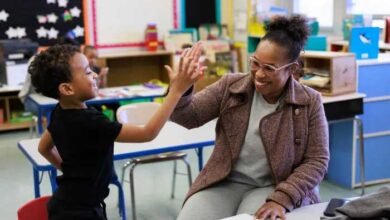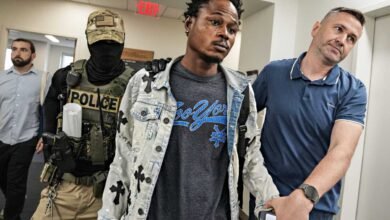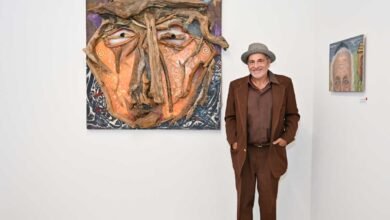A cut above: How a queer, Black, woman-owned barbershop makes space for the LGBTQIA+ community
When Khane Kutzwell, 52, heard friends talk about being mistreated at neighborhood barbershops, the entrepreneurial-minded immigrant from Trinidad saw a need.
“Gay people, even straight women, were just being refused service. A lot of women get that ‘I’m not cutting your hair’ at barbers,” Kutzwell said. “Oh yeah, the barber industry is one industry that goes unchecked.”
She described how a neighborhood barbershop can be an unwelcoming space when it plays “derogatory music” or displays offensive, explicit material. “Not the kind of atmosphere somebody can bring their girlfriend or their kid,” she said.
At the time, Kutzwell had been the store manager of a national coffeeshop brand, responsible for 30 employees, but she found a way to attend barbershop school as she continued working. “Don’t ask me how I did it because I don’t remember,” she said on a recent Friday. “All I know is that’s what I wanted to do and I made it happen.”
Her name also reflects her personal drive. “Khane” is a reference the sugarcane that Trinidad is known for. And “Kutzwell” came when she started barbering, figuring if she started to call herself that she would have to indeed “cut well.”
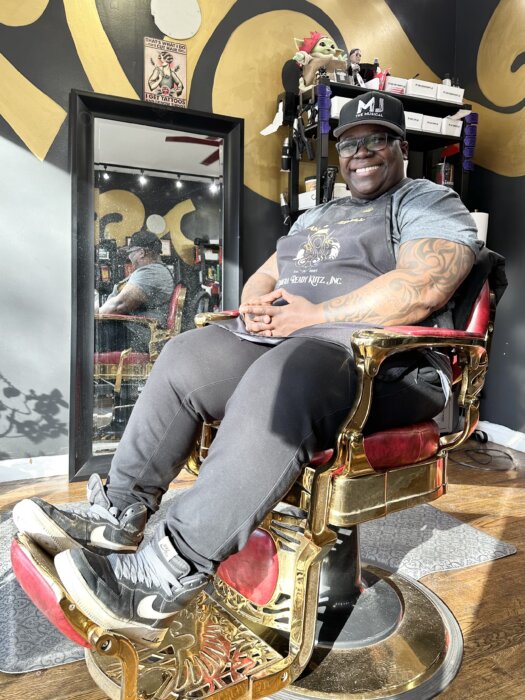
In 2007, she earned her license and began to work out of her own home in Crown Heights. When she started taking clients, she recalled that some would show up with their heads down.
“You know, just showing low self-esteem, unsure because maybe they had a terrible experience at some other barbershop two weeks ago. And by the time we were finished with the cut, their heads would be up, and they’d be talking, and looking in the mirror. They’d take out their phone for a selfie. I was like, ‘Oh, you’re camera-ready.’ That’s when the idea for ‘Camera Ready Kutz’ came to be.”
In 2017, she opened Camera Ready Kutz at 73 Utica Avenue, a busy corridor of immigration law offices and chicken joints (curried, stewed, jerk), African hair braiding shops, and a mural of Shirley Chisholm, the Crown Heights icon who was the first Black woman elected to the US Congress.
When Kutzwell’s landlord urged her to expand, she took the retail spot next door, allowing her barbers and clients to spread out for social distancing when the pandemic hit.
The shop has a sign-in book where customers are encouraged to draw and write as a way of sharing their creativity. A bearded drag queen is painted on one wall. And the bathroom has a basket of free condoms to encourage safe sex.
On a recent Friday afternoon, Michael Montano’s music played in the background and a handful of master barbers were busy one on side of the shop as Kutzwell mentored a young apprentice, her 18-year-old cousin Da’Shawn Scott, who had just completed barber school days earlier and is currently part of a two-year barber academy that she runs free of charge for teenagers.
“Anything that you learn you have to put it into practice,” Kutzwell said. “So it takes a while to become proficient.”
The shop has a strong sense of community. And everyone who comes through the shop contributes to its growth. Past barbers have painted the walls, creating murals inside and out. Some have come up with new shop rules and protocols — one beautician standardized how capes should be folded over the backs of chairs.
And when she interviews anybody looking to get hired, Kutzwell said the most important skill she looks for is how they relate to others. “If there’s a hint of discrimination of any kind, whether it’s, y’know, discrimination based on who someone chooses to love, or anything like that, that person’s not working here, because this is an all-inclusive shop. Not everybody that works here is gay, but the majority of people who come in are — and we have people of all different ages, sizes, nationalities.”
The place is so judgement-free that, Kutzwell said, “A lot of teenage boys started coming to me and complaining about how when they go into other barbershops they feel like they have to put on a certain air.” She has grown men who see her, too. One burly guy even broke down and cried when he stepped through the front door. Kutzwell says her clients are tired of spaces where they’re expected “to act in a certain way, instead of just being ourselves.” She said. “No one is brave enough to just be gentle.”
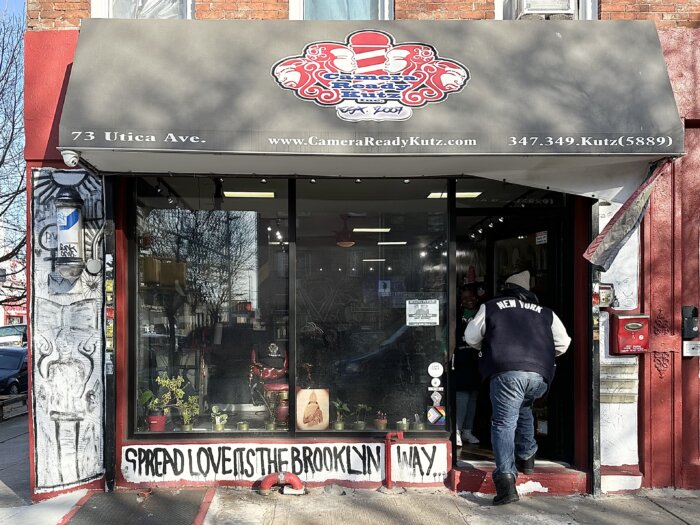
Now seven years at the current location, Kutzwell is ready for a refresh. “I’m always trying to keep things updated and looking good,” she said.
She started a Gofundme campaign early last month to raise funds to cover the costs of new awnings, a fresh paint job, two barber poles, and barber chairs and stations.
Kutzwell, who reluctantly uses “queer” to describe herself because she doesn’t like labels that announce or justify identity (though she’s fine with any and all the pronouns), explained, “I really don’t care what pronoun you call me because all my life I’ve been called both. You know, always mistaken for a boy or whatever. Which never really bothered me. Not to say that there weren’t times when things were terrible, but ultimately, I know how I chose to present myself and I’m comfortable with it.”
But because the barbershop is such a male-dominated industry, she does want people to know that her shop is female-owned, black-owned, LGBTQIA-owned.
It’s what brought in Lisa Kanyarusoke, 31, an out-of-town visitor from Pittsburgh and a self-described LGBTQ ally, to get a cut before attending a Broadway show on Saturday. “I had too much to do to get out of town and the haircut was put on the back burner,” Kanyarusoke said. “And today I was like, I want to feel good when I go to the show tomorrow.” (She was seeing “Chicago” featuring “The Vanderpump Rules” reality star Ariana Madix.)
Kanyarusoke, a woman of Ugandan descent, commented that after a quick Google search, she decided to visit the shop because it was woman-owned and LGBTQ-focused. For Kutzwell this is exactly the kind of business and brand-awareness that she’s been building for the past 17 years.
As Kutzwell held up the mirror to show Kanyarusoke the finished cut, she smiled.
“You get me,” Kanyarusoke said. “I knew you would.”
Source link



